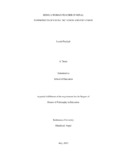Please use this identifier to cite or link to this item:
http://archive.nnl.gov.np:8080/handle/123456789/146| Title: | Being a woman teacher in Nepal : experiences of social inclusion and exclusion |
| Authors: | Paudyal, Laxmi |
| Keywords: | Teaching--Women--Nepal Women teachers--Nepal Social inclusion Social exclusion |
| Issue Date: | 10-Jun-2018 |
| Abstract: | This research identifies the aspects that motivate women to take teaching profession, explores the experiences of women teachers on social inclusion and exclusion when they start and continue teaching profession, and critically evaluates the strategies that they employ to cope with problems and social exclusion. The study is conducted within the theoretical framework of critical theory - knowledge and interest of Habermas, poststructuralist -power, knowledge and resistance of Foucault, socialist feminism, and specialization and monopoly paradigm of social exclusion to interpret the information generated from critical ethnography. This is a qualitative research based on core values of critical ethnography. Six public schools of Kathmandu, Lalitpur and Kavre were selected and the twenty-one women teachers of these schools were selected as the main research participants for this research. Dialogical interview, observations, and analysis of documents were the main methods for information generation. This research found that both intrinsic and extrinsic motivations generated by the desires and needs make women take teaching profession. Besides these, sometimes negative forces such as regret also motivate some women to choose this profession. Aspects such as biological, stereotype gender roles, socialization process, and patriarchy culture heavily influence the professional life of women teachers. These aspects compel women teachers to avoid the opportunities for leadership and professional enhancement programs. This research also revealed that aspects such as attitude towards the profession, personal commitment and sacrifice, Bhan Soon and Afno Manchhe culture (relation), position power, communal affiliation, prior experience, pro-women policy, married status, being local and family support system determine their social inclusion status in their career. On the contrary, being an outsider, unmarried status, physically disabled, dalit made them feel excluded while getting teaching profession. The roles of women at home and schools were found in transition as women teachers play the agentive roles of both maintaining the social order and promoting changes and innovations in the society. I have found the Traditional, Transitional and Transformational (3T) positions of women teachers in Nepali society. The women teachers were not always found as passive recipients of social exclusion. They had agency and power to cope with problems and social exclusion. They applied silence, micro and macro resistance against social exclusion. This research demands the policy attentions to change power relation, stereotype gender division of roles, non-discriminatory policy implementation and empower women teachers. Social inclusion of women in teaching profession can be addressed through Nine Cornerstones of Social Inclusion (NCSI). |
| Description: | A thesis submitted to School of Education in partial fulfillment of the requirement for the Degree of Doctor of Philosophy in Education, Kathmandu University, 2013. |
| URI: | http://103.69.125.248:8080/xmlui/handle/123456789/146 |
| Appears in Collections: | 300 Social sciences |
Files in This Item:
| File | Description | Size | Format | |
|---|---|---|---|---|
| 105-Dr Laxmi Paudyal.pdf | 1.28 MB | Adobe PDF |  View/Open |
Items in DSpace are protected by copyright, with all rights reserved, unless otherwise indicated.